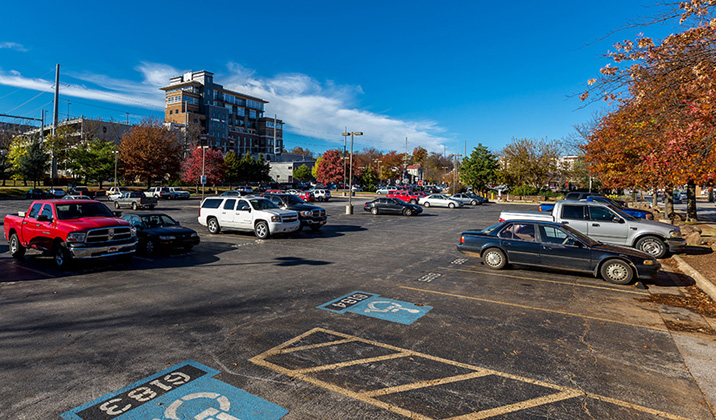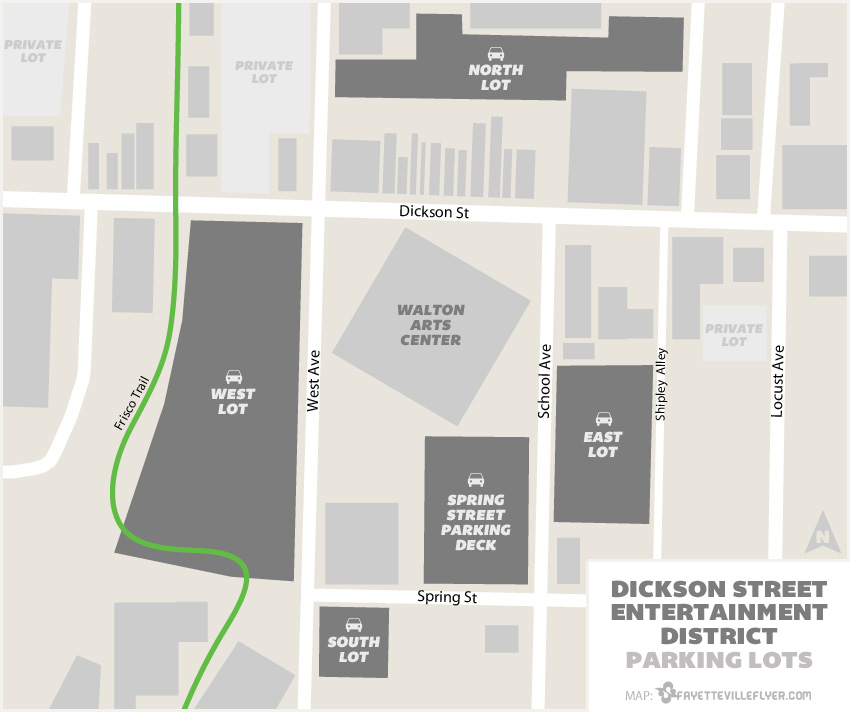
The city-owned West Lot, also known as the Walton Arts Center parking lot, stands at the southwest corner of West Avenue and Dickson Street.
Photo: Todd Gill, Fayetteville Flyer
Now that the new parking deck is open, developers are hoping Fayetteville officials are willing to sell one of the city’s most prime pieces of undeveloped real estate – the West Lot, also known as the Walton Arts Center parking lot.
“We’ve had a number of people approach us about it,” said Jeremy Pate, the city’s development services director.
Pate said city planners have met with multiple groups lately who are interested in purchasing all or a portion of the municipal parking lot across from the Walton Arts Center campus at the southwest corner of West Avenue and Dickson Street.
“There has been a lot of interest in the property,” Pate said last week. “Probably because the Downtown Master Plan shows it being developed at some point in time.”
Pate was referring to City Plan 2030, Fayetteville’s comprehensive land use plan which calls for eventual development of the West Lot to one day connect the commercial spaces and buildings on Dickson Street with the Walton Arts Center and the rest of the entertainment district.
That, combined with both the lot’s prime location and the recent completion of the Spring Street Parking Deck, are likely contributing to the spike in interest in the property.
“The timing is better now than it has ever been since because the deck opened,” said Pate. “That said, we didn’t build a new parking lot to replace parking (in the West Lot.) We built it to enhance the available parking, and we don’t want to jump into anything that places us in the same needs as before.”
Mayor Lioneld Jordan agreed.
“We aren’t going to do anything down there to reduce the amount of parking,” Jordan said in a phone interview. “Parking has been a problem on Dickson Street for a number of years now, and we’ve got to add parking down there, not take it away.”

Jordan said he has sat through multiple meetings at the request of developers who are interested in building something on the parking lot.
One of the more persistent groups has been Hunter Haynes and Alex Blass, who hope to soon unveil a proposal they believe will alleviate the city’s concerns over losing parking downtown should officials eventually agree to sell the land.
The two developers have been in the initial phases of designing a mixed-use project which would take up the entire footprint of the West Lot. Their project, Haynes said, would include a mix of commercial and residential units along Dickson Street, as well as green spaces, public areas, and most importantly, plenty of public parking.
Haynes and Blass said conceptual site plans include a structure large enough to add parking for all the residents and businesses associated with the development, plus an increase in the current parking available in the West Lot as it stands today.
“There are 297 spots in that lot, and we’re not talking about making it 298,” Haynes said. “I’m not going to say we’ll double it, but it will be a considerable gain in public parking.”
The developers say they are still in the early stages of work on the project, working with Knowles Blunck Architecture on design, and talking with stakeholders on Dickson Street about their potential concerns.
“There are certain areas of Northwest Arkansas that are identity pieces, and Dickson Street is one that the whole region identifies with,” Haynes said. “We want to be respectful of that because we consider this home, and we want the finished product to be something that everyone can be proud of.”
Jordan said as of last week he had received no formal offers to purchase the lot from Haynes and Blass, or any other developers.
According to City Attorney Kit Williams, the City Council is the only body with the authority to sell city-owned property.
“The City Council serves as the landlord for all city property, so they would have to approve any offer to purchase,” Williams said, adding that city ordinances prevent the sale of any public land without a competitive bidding process.
The sale of a portion the former Mexican Original plant to Kum & Go in 2013 is an example of that bidding process at work, Williams said.
That deal took months of negotiation between the convenience store chain and city staff before the mayor brought an offer to the council, Williams recalled. From there, the council opened the bidding process, a second buyer got involved, and the city was ultimately able to increase the amount of money it received for the land.
Pate said just because planners are listening to developers, it doesn’t mean the city is actively marketing the property.
“We may put it out for RFP eventually,” Pate said. “But that’s not a project anyone has on their to-do list at this time.”

